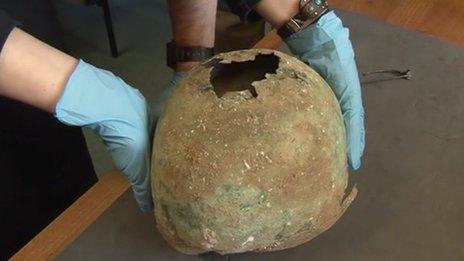Iron Age bronze helmet found on Canterbury farmland
- Published

More or less intact helmets of the era are very rare finds, said University of Kent archaeologist Dr Steven Willis
A rare Iron Age helmet unearthed by a metal detector enthusiast on farmland near Canterbury has been described as a significant find by the British Museum.
The bronze helmet was found with bone fragments, and had been used to hold human remains after a cremation, Canterbury Archaeological Trust said.
The finder contacted archaeologists because he was confident he had made a significant discovery, the trust said.
University of Kent experts have found it dates back to the 1st Century BC.
Andrew Richardson, finds manager at the trust, said the person who found the helmet wanted to remain anonymous.
Registered as treasure
A brooch that would have fastened a bag holding the cremated bone was also unearthed, he said.
Julia Farley, Iron Age curator at the British Museum, said it was one of a handful of Iron Age helmets found in Britain.
She said it was not unusual to bury cremated remains in a bag fastened with a brooch in late Iron Age Kent.
But she said: "No other cremation has ever been found accompanied by a helmet."
She added: "The owner of this helmet, or the people who placed it in the grave, may have lived through the very beginning of the story of Roman Britain."
Dr Steven Willis, senior lecturer in archaeology at the University of Kent, said laser-scanning technology had been used to analyse the helmet and establish details of its manufacture, decoration and use.
He said: "The secrets of this helmet are only just beginning to emerge but we will know much more as the work progresses."
Dr Willis also said more or less intact helmets of the era were very rare finds.
He said one was known of in Belgium that had also been used as a cremation container.
The objects have been registered as treasure, reported to the coroner, and will remain at the British Museum, the university said.
But academics said it was hoped Canterbury Museum would be able to acquire the finds so they could be permanently displayed in Kent.
Experts from the British Museum, Canterbury Archaeological Trust and the University of Kent talk about the importance of the find
- Published4 December 2012
- Published30 September 2012
- Published27 September 2012
- Published10 September 2012
- Published27 August 2012